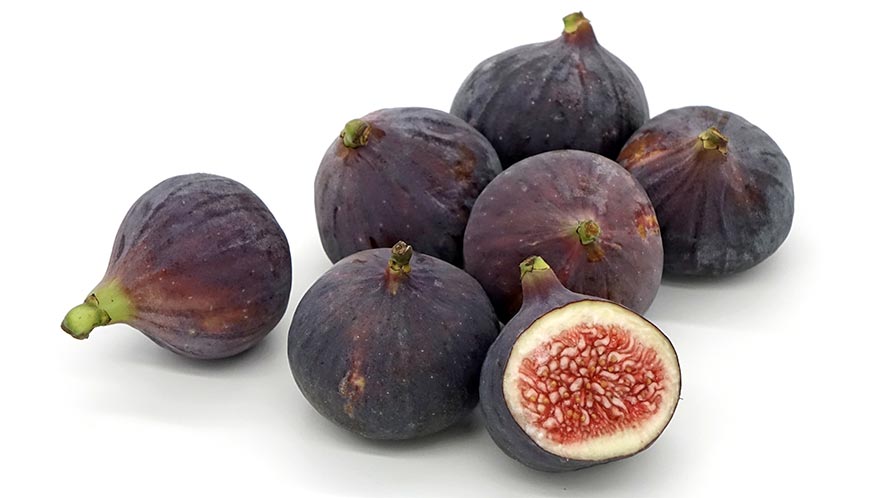Figs Nutritional Value and 11 Health Benefits
Talk about figs and you sure would be reminded of the dried counterparts available everywhere, all throughout the year. But then, have you ever tasted the fresh, luscious figs? Those who have would know the sweet flavor, smooth texture, and crunchy interior of figs. For rest, this write-up would surely coax you to get your hands on the fresh variety not just because of the luscious taste, but also due to the rich nutritional value.
Commonly grown in southwestern Asia, figs grow on the Ficus tree (Ficus carica), which is a member of the mulberry family. Interestingly, the fig is supposedly one of the first few plants, which were cultivated by humans during the early years. It is presumed that the figs were the ‘only’ cultivated plants for a thousand years. Romans ate figs with great delight. The Bible is known to hold the first reference to figs.
It is believed that when Adam and Eve were in the Garden of Eden, they had clad themselves with fig leaves. Hence, figs hold the utmost importance in Christian culture. Figs are highly nutritious and have great medicinal uses. They can be eaten fresh as well as dried or jammed, and hence are always available. Not just the fruit, but the leaves of the tree are also edible.
In the following lines, we have provided details about the nutritional content and health benefits of figs. Go through them and note what good fig does to humans!
Figs Nutritional Value and Facts
Amount of Fig: 1 cup
Total Weight of Fig: 149 g
| Nutrients | Amount |
| Basic Components | |
| Protein | 4.9 g |
| Water | 44.8 g |
| Ash | 2.8 g |
| Calories | |
| Total Calories | 371 |
| Calories From Carbohydrate | 343 |
| Calories From Fat | 11.6 |
| Calories From Protein | 16.5 |
| Carbohydrates | |
| Total Carbohydrate | 95.2 g |
| Dietary Fiber | 14.6 g |
| Starch | 7.6 g |
| Sugars | 71.4 g |
| Fats & Fatty Acids | |
| Total Fat | 1.4 g |
| Saturated Fat | 0.2 g |
| Monounsaturated Fat | 0.2 g |
| Polyunsaturated Fat | 0.5 g |
| Total Omega-6 Fatty Acids | 514 mg |
| Vitamins | |
| Vitamin A | 14.9 IU |
| Vitamin C | 1.8 mg |
| Vitamin E (Alpha Tocopherol) | 0.5 mg |
| Vitamin K | 23.2 mcg |
| Thiamin | 0.1 mg |
| Riboflavin | 0.1 mg |
| Niacin | 0.9 mg |
| Vitamin B6 | 0.2 mg |
| Folate | 13.4 mcg |
| Pantothenic Acid | 0.6 mg |
| Choline | 23.5 mg |
| Betaine | 1.0 mg |
| Minerals | |
| Calcium | 241 mg |
| Iron | 3.0 mg |
| Magnesium | 101 mg |
| Phosphorus | 99.8 mg |
| Potassium | 1013 mg |
| Sodium | 14.9 mg |
| Zinc | 0.8 mg |
| Copper | 0.4 mg |
| Manganese | 0.8 mg |
| Selenium | 0.9 mcg |

Health Benefits of Figs
- It is seen that figs work wonders in preventing constipation. This is because figs have a good amount of fiber content in them. A high amount of fiber is extremely vital for the proper functioning of the digestive system.
- For those who are looking forward to shedding some weight, figs are a must-have ingredient for inclusion in the diet. Doctors in fact prescribe them to obese people for the same. Ironically, figs are also a weight gainer if consumed with milk.
- Fig is a fibrous fruit and contains different types of fibers. It also contains pectin which is a soluble fiber. Pectin has the property of cleansing the cholesterol out of the body.
- Another interesting fact about figs is that this fruit contains phenol, omega-3, and omega-6 acids. These are the fatty acids that are known for preventing coronary heart diseases.
- Fig being a fibrous fruit has a lot of benefits, apart from being helpful in digestion. It mops out the cancerous developments from the body and prevents colon and breast cancer.
- Fig leaves are known to possess great anti-diabetic properties. Fig leaves reduce the amount of insulin needed by diabetic patients who have to take insulin injections. Also rich in potassium, fig helps control blood sugar.
- Fig helps as a balancing agent for patients who suffer from hypertension. Hypertension is a result of high sodium and low potassium diet. Being low on sodium and high on potassium, fig helps keep the balance between the two chemicals in the body.
- Figs are age-old aphrodisiacs known to man. Figs can work wonders in reducing sexual weakness. Just soak a couple of figs overnight in a glass of milk and consume them in the morning. The same concoction acts as a weight-gaining tonic.
- Fig fruit is high in calcium and hence helps in building and strengthening bones.
- The fruit is especially beneficial for old people as it helps them retain their vision because the fig helps in slowing down macular degeneration.
- For those suffering from sore throat and cold often, having figs has proved to be beneficial. Figs contain high mucilage content which helps in providing relief against sore throat.
Figs are perhaps one of the most complete foods available to humans. Include them in your diet and make way for healthy living.
Embracing the Nutritional Wealth of Figs
Figs, often overlooked in their fresh form, hold a treasure trove of nutrients essential for a wholesome diet. From their historical significance as one of the earliest cultivated plants to their luscious taste and versatility in culinary uses, these fruits offer more than just flavor. Exploring their nutritional composition reveals an array of vital elements essential for a healthy lifestyle.
Unveiling the Nutritional Bounty
A cup of figs, weighing about 149 grams, contains a rich assortment of nutrients. From proteins to carbohydrates, fats, vitamins, and minerals, these fruits pack a considerable punch in terms of nutritional value. With substantial amounts of fiber, figs aid in digestive health, prevent constipation and even play a role in weight management. Moreover, their diverse nutritional profile makes them a powerhouse of elements like calcium, potassium, and essential fatty acids, contributing to overall well-being.
Figs: The Gateway to Health
Delving deeper into the health benefits, figs emerge as an unsung hero in promoting various aspects of well-being. Their high fiber content not only aids in digestion but also contributes to lowering cholesterol levels, combating coronary heart diseases, and potentially preventing cancerous developments in the body. Moreover, figs exhibit properties that assist diabetic patients by reducing insulin requirements and regulating blood sugar levels.
A Holistic Approach to Wellness
Beyond these, figs extend their benefits to bone health, vision retention, and even as a natural remedy for sore throats. Their calcium-rich composition fosters bone strength, making them especially valuable for the elderly. Additionally, the fruit’s mucilage content provides relief against sore throats and colds, showcasing their holistic healing properties.
Embrace Figs for a Healthier You
Incorporating figs into your diet could be the gateway to a healthier lifestyle. Whether enjoyed fresh, dried or as a jam, these fruits offer a multitude of health advantages, making them a compelling addition to any dietary regimen. From addressing digestive issues to fortifying bones and assisting in disease prevention, figs stand as a testament to the potency of natural foods in nurturing our health.
Conclusion: A Call to Embrace Figs
In conclusion, the nutritional richness and myriad health benefits of figs underscore their significance as a dietary essential. Their historical legacy, coupled with their multifaceted advantages for health, make them a valuable addition to meals. From the ancient times of Adam and Eve to the modern quest for healthier living, figs remain a timeless, wholesome choice offering a delectable path to overall well-being. Incorporate figs into your diet and savor not just their sweetness, but also the abundance of health they bring to your life.
